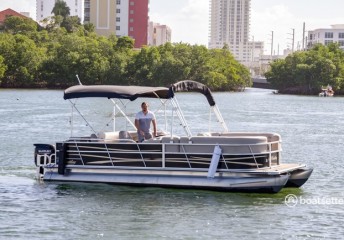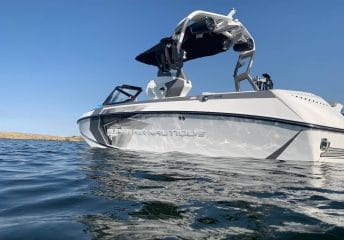Boat Taxes: Everything You Need to Know
Last Updated on September 28, 2023 by Boatsetter Team
Taxes are a fact of life as well as a part of boat ownership but there may be some good news, especially in certain purchase situations and if you use your vessel as a second home or as a business. Regardless of how you buy or use your boat, brush up on the details of boat taxation to comply with federal and state laws.
Post summary:
- Sales tax
- Property tax
- Boat used as a second (or primary) home deduction
- Boat used for business deduction
- Boat used for transportation deduction
- Boat used for charter deduction
- Boat donation deduction
List your boat for rent. Earn an avg of $20K annually with Boatsetter!
Sales tax
When you buy a boat, you’ll most likely be paying a sales tax like you do on any other products you purchase. There are exceptions and they vary by state. You can avoid paying sales tax in the states that don’t assess sales taxes (Oregon, Delaware, and others) or if you’ll use your boat in states with a sales tax but only for short periods. Even if you bought your boat in a state without sales tax (say, Oregon) but go boating in a state with sales tax (say, Washington) you may be assessed a use tax by the state of Washington.
You may take possession of your boat via an offshore delivery which means you sign ownership papers outside of the state or its territorial waters. However, you must then keep the boat out of that state, for at minimum a year. Not all states have a provision for offshore delivery so do your research and remember that this proposition makes sense if one) you’re ready to not boat in the state where you bought the vessel or 2) if the boat is expensive enough (with a significant sales tax value) where commuting to it for a year makes sense. You may need proof of the offshore process in case you’re audited so keep good records.
Property tax
As with homes, property taxes are assessed on boats. Additionally, some states require their marinas to pay taxes and they in turn pass this burden on to boat owners. You may in effect, be paying taxes on the water in your slip. There are no loopholes for boat property taxes.
Boat used as a second (or primary) home deduction
A boat can qualify as a first or second home as long as it has sleeping accommodations (berth), a bathroom (head) and a kitchen (galley). You can take a mortgage interest deduction if your boat is financed and a home office deduction if you work from your boat. You’ll need to do itemized taxes and file IRS Form 1098.
Boat used for business deduction
If you use your boat to entertain clients, you can qualify for a deduction so long as “business was discussed” during the time it was used in this manner. You must keep thorough records of when, where, how long and with whom you boated and then you can deduct up to 50% of the expenses incurred during that outing including fuel, additional mooring or berthing fees, entry fees (for fishing tournaments or regattas, for example) and food/beverages.
READ MORE: Boatsetter Fishing Tournaments Sponsorship Program
Boat used for transportation deduction
Let’s say you live on an island and you use your boat to commute at least half the time for work or business. You can deduct quite a few expenses including slip fees, fuel, insurance, maintenance and repairs, and crew costs. This is an “or” use meaning that it won’t be possible to claim this deduction if you use the boat to entertain clients and use it for transportation.
Boat used for charter deduction
If you charter your boat with a peer-to-peer (P2P) marketplace like Boatsetter, you may be able to deduct some costs of ownership but there are stipulations.
First, the costs you can claim: equipment and purchases and upgrades, slip/mooring fees, fuel, maintenance and depreciation. Now the requirements: you must show a profit at least three years out of every five and you can only deduct the percentage of the above costs that the boat was chartered. You can’t deduct all of it if you’re using the boat for your own recreation as well.
Pro tip: Keep meticulous records, you’ll be taxed on your income at a state and federal level, and you may need to upgrade to commercial boat insurance to conduct a charter business so do the math to make sure it’s worth it.
Start listing your boat for rent here
Boat donation deduction
When it comes time to dispose of your boat, you can donate it to charity instead of selling it. In this case, you can deduct the “fair market value” for which you’ll need a professional appraisal and survey (which costs money). The charity must be not-for-profit. The benefits are 1) not having to find a buyer and 2) transferring the boat fairly quickly with the charity processing the paperwork and providing an IRS Form 1098-C. If the charity sells the boat, you can only claim a tax deduction equal to the sales price, not your initial appraisal.
Taxes are fluid and tax laws change not only by jurisdiction but also over time. For complex issues that may involve significant amounts of money, keep thorough records and consult your CPA or a maritime attorney because boat deductions tend to raise red flags. Once you have it figured out, you’ll be able to deal with the taxman like a champ.
About us
Boatsetter is a unique boat-sharing platform that gives everyone—whether you own a boat or you’re just renting—the chance to experience life on the water. You can list a boat, book a boat, or make money as a captain.
Rent. List. Share—Only at Boatsetter

Boatsetter empowers people to explore with confidence by showing them a world of possibility on the water. Rent a boat, list your boat, or become a Boatsetter captain today.










